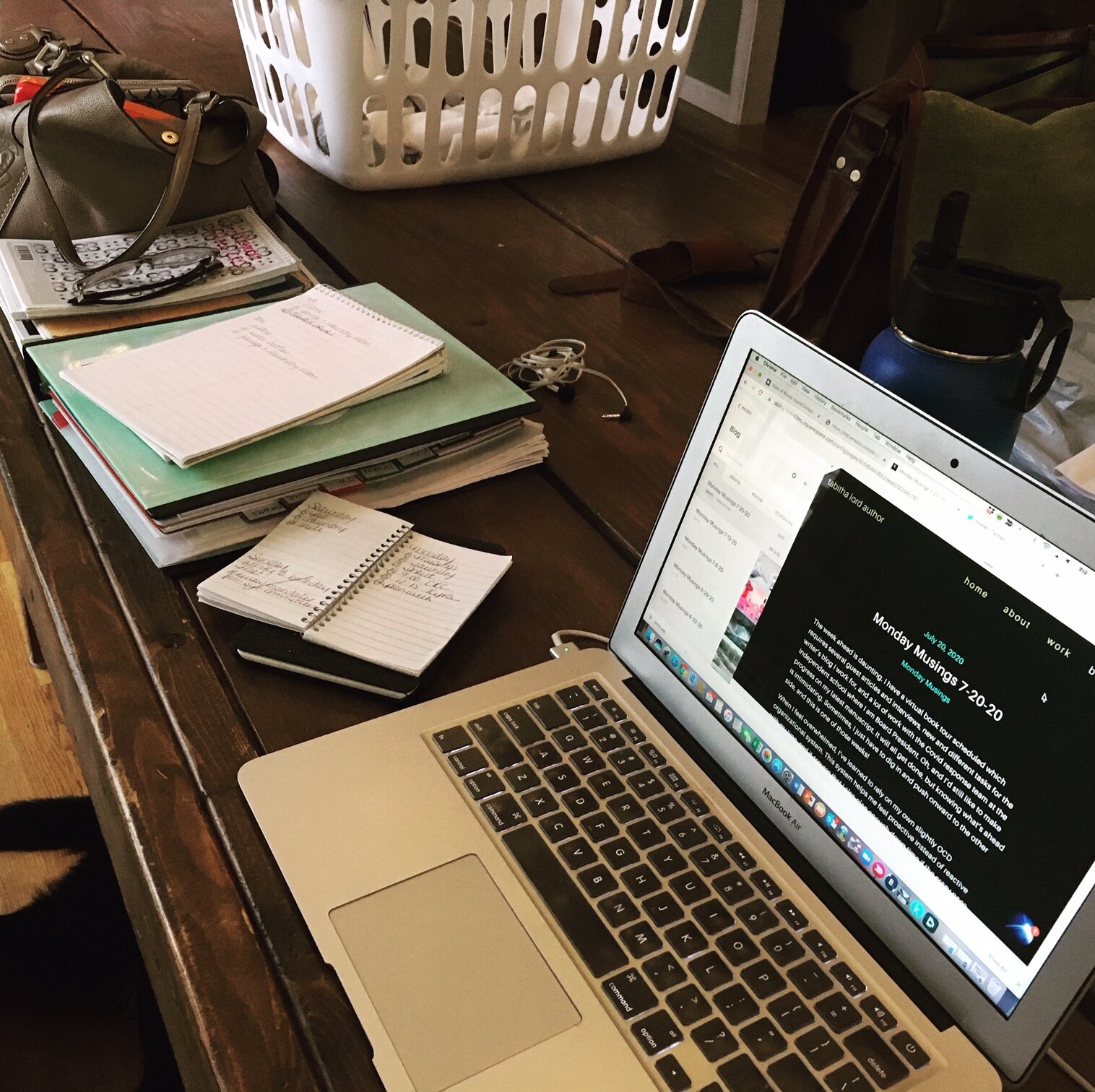The week ahead is daunting. I have a virtual book tour scheduled which requires several guest articles and interviews, new and different tasks for the writer’s blog I work for, and a lot of work with the Covid response team at the independent school where I am Board President. Oh, and I’d still like to make progress on my latest manuscript. It will all get done, but knowing what’s ahead is intimidating. Sometimes, I just have to dig in and push onward to the other side, and this is one of those weeks!
When I feel overwhelmed, I’ve learned to rely on my own slightly OCD organizational system. This system helps me feel proactive instead of reactive with my time, and it assures that I also plan enough down time if the crazy pace lasts too long. Over the years of trying to balance career, family, creativity, volunteerism, and my own mental health, I’ve come up with some principles to stay sane. I’ve written a lot about this, especially as it pertains to managing a career in the arts.
Since I am so pressed for time today, I’m cheating a bit and attaching one such article. I needed the reminders today, and maybe they’ll be useful to you as well!
Balance the Busy: A Writer’s Guide
For some people, summer is a relaxing time. When my kids were little and school ended, our schedule slowed down and I took advantage of that time to recharge. Now, not so much. My work heats up with the warm weather, and while I look forward to it, I also know those long, lazy days of summer are a thing of the past. In fact, if I’m not careful, long, lazy days anytime are a thing of the past.
It seems that everyone, writers included, are busy people, working to balance multiple obligations. Because we can, many of us work flexible schedules, which may translate into working all the time. We forget to shut down. We feel overwhelmed. We find we aren’t actually as productive or healthy as we want to be. Over the years, I’ve discovered some principles, proven to translate across careers, that help me stay organized, maintain balance in my life, and get things done. Maybe you’ll find them helpful.
Recognize Your Rhythm
Maybe you’re most creative in the morning over a cup of coffee, or late at night when everyone’s asleep. Maybe you feel super productive in the fall, but can’t seem to get out of your own way in the summer. Whatever the case, everyone has a rhythm – to their day, to their week, to their year. Honor that rhythm, learn to use it to your advantage, and recognize that it may change over time.
Keep a Schedule
Take time to organize yourself. I am an obsessive planner. I use an online calendar and an intricate system of notebooks and to-do lists to stay organized. To friends and family, my habits may seem a bit obsessive, but maintaining control over my time is the single most important factor impacting my productivity. When something unexpected happens – I’m sick, my kids are sick, my computer dies – I do what I have to do to get through, and as soon as possible, I sit down to reorganize. If I’m proactive as opposed to reactive with regard to managing my time, I feel less stressed and I’m definitely more productive.
Prioritize
There is always more to do, but not everything should make the top of your to-do list. Prioritize your daily tasks, writing projects, appointments, etc. Some things can be pushed off if you don’t get to them, but some things come with a deadline! Make it a habit to attend to the priorities first.
Mind Your Mental and Physical Health
When I was in college, inevitably I’d get sick as soon as I went home for a vacation. It was like my body did what it had to do to get me through exams, or a big project, or whatever, and then it totally shut down. I’ve learned it doesn’t have to come to that if I pay attention and take care of myself. Self-care is important. Block off time for the gym, a yoga class, dinner out. When deadlines loom or the to-do list is jam-packed, it might seem practical to bump one of these things. But self-care shouldn’t take last place, penciled in only after all the “work” things. Rather, it should hold equal importance. It has to. Much of the writer’s life is solitary. We’re alone in our own minds for a good bit of the day, and this isn’t necessarily good for our mental health. So be mindful to step away, seek out the company of others, and take care of yourself.
Just Say No
It’s tempting to say yes to every interesting project that comes along, especially if you are trying to launch a new career. Maybe for a little while, you do need to say yes often, but pretty soon you may become overwhelmed, or find yourself committed to projects that aren’t really the best use of your time. When considering a new project, I always sleep on it before making a commitment. Either my interest will grow or it will dissipate. If I’m still enthusiastic after a couple of days, I’ll figure out how to make it work. If not, I graciously say no thank you.
The culture of busy isn’t going anywhere. In our time of instant communication, real-time information, and constant connectivity, we can easily become overwhelmed. A mindful habit of working with our personal rhythms, organizing and prioritizing our work, and paying attention to our own good health will help.




